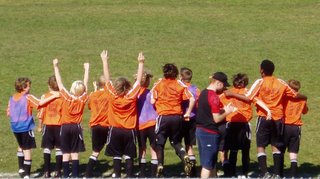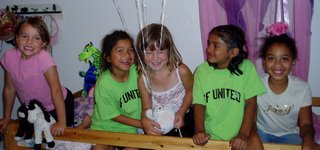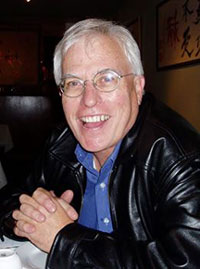
Out in the middle of San Francisco Bay sit two islands -- Yerba Buena, which is a giant rock rising far above the water; and Treasure Island, a flatlands built from bay fill and until recent times, a U.S. Navy base.
Now it is just another zip code in the city (94130), with civilians now living where midshipmen and their families used to be housed. When it pulled out, the military left three baseball diamonds, the nicest of which is called Tepper Field.

It is a very pretty field, and today our team played its first playoff game there. We lost, 5-2, but the kids played well.
As the afternoon aged, winds came whipping across the Bay from the Golden Gate, where offshore fog loomed. But the breezes never made it through the island to Tepper, which sits on the eastern shore (toward Berkeley), so it was shirtsleeves all the way today.
It's still warm tonight in the Mission. The Detroit Tigers won the second game of the World Series. Another week and it will all be done -- the Little League season, the Major League season. The equipment gets put away, the records get filed, and the scorebook gets lost between layers of winter papers, just waiting to blow into my office.
By spring, I'll have to dig it out from beneath a foot of other stuff that will have piled up just as surely as desert soil piles up around Beijing.
I've been an environmentalist since 1968; even before that, but I didn't know the word. That is the year I published my first environmental story. In the next decade, scientists identified the hole opening in the ozone layer over the South Pole as a major threat to the future of humanity. After some initial funny business, in the form of false scientific reports funded by the industries producing the gases responsible for the hole, the nations of the world got together to ban these destructive gases.
A miracle then occurred. The atmosphere started repairing itself. Now, the scientific consensus is we do not face any serious threat from the hole in the ozone, which will probably disappear altogether later in this century.
That a similar concerted effort will be required to face a much greater challenge -- global warming -- is axiomatic. Politicians like the decision-makers in the Bush administration who have blocked efforts to address this issue are not going to look good in the history books. They were either slow to recognize the urgency of this problem, or they cynically used their time in power to ignore the evidence and reap the rewards of the powerful interests who have funded their silence.
The next U.S. President is going to have to be a global environmental leader. Maybe Al Gore ran eight years too early?
***
Growing up as I did in central Michigan, I loved the outdoors. Michigan is a beautiful state, green, forested, and dotted with rivers and lakes. We hiked and swam and fished and camped all over the state. Summertime there transforms the landscape into a lush, deciduous landscape redolent of herbs and flowers as well as the distinct scents of maple, oak, elm, poplar, birch, beach and pine.
Birch trees always were my favorite. You had to get far enough north before you could see them. Their white bark always seemed so exotic, as did its soft velvet underbelly, and the historical marvel of birch-bark canoes. (Will global warming force Michigan's birches to march northward, to the other side of Lake Superior? Will they abandon my home state to retreat into my father's home country?)
I loved reading about Indians in my youth, how they slipped through the woods noiselessly, tracking game, taking only what they needed for food and sustenance. When I was a young boy, I practiced walking softly. To this day, I don't seem to make very much noise as I glide through a field or forest, along a beach, or even on a street.
I like walking lightly on this earth. I know we are all walking on the bones of our ancestors, compressed into a few inches of topsoil clinging to a rocky, molten core hurtling through space -- away from the violence of the Big Bang, as reflected in the echoes of our television sets when they are between channel signals; and toward the violence of our inevitable ending when the sun explodes and we and everything we have ever known is obliterated.
As I walked through my backyard this morning, I thought about how natural death is. It's just another phase in the natural order. Not long ago, plums and apples clung snugly to their stems on the fruit trees back there. They seemed to multiply daily, their round bodies firm and green.
Then, weeks of sun turned them purple and red. They now were at their peak of beauty, so sensuous and well formed that they beckoned us to touch them. My 12-year-old son did what boys (and girls) have always done at the sight of such temptation. He climbed the trees and grabbed whatever fruit he could reach. He shook the branches and instructed his younger charges below to catch the falling fruit, lest they be bruised.
Those times are distant memories now, as the fall light slants into a yard denuded of the clover and sour grass of last spring. Even as new grass sprouts, here and there misshapen piles of dead, rotting fruit, pock the yardscape. What once was young, sweet, firm and promising now is brown, rancid, full of sickly fluids that smell like fermented old drunks, passed out on the street.
The seasons succeed each other. Now comes a time of danger for the old, the weak, and the feeble. Now is the time to get flu shots.
***
Once upon a time I met a girl from a very rich background. She was a wild girl, with wild hair, curly and dramatic. She was dramatically beautiful as well, sexy and spontaneous and willing to try anything at least once. I loved her stories when she told them to me, in a bar where they served us drinks of indeterminable composition that were named after her. Named after her! Can you imagine having a drink named after you?
In those years, being a journalist from the old school, I thought I could hold my own under such circumstances, and usually I did. (Though not one night drinking with Molly Ivins, but that is another story.) This girl, skinny and excited, matched me and then some. When it came time to leave, I was loaded and she was not.
The following day I was sick, one of only a very few times in my now long life that this happened to me.
Over the ensuing year we met now and again, once, memorably, at the Algonquin, where she said the doormen thought she was a hooker. Little did they know she was wealthy enough to buy their hotel with her pocket change, though she
did dress rather provocatively that particular night. We met here and there, now and then, and always enjoyed drinking and talking, and a bit of flirting.
The last time I saw her, we got out of a cab together and I kissed her goodbye as she caught a train out of Penn Station. I lost my cellphone that night. A crazy woman called me the next day, saying she had found it, and claiming she was a doctor on the Upper East Side. But all she really seemed to want to know was: "Who was that woman you were with? Is she your girlfriend? How did she get that amazing hair?"
"Will you please send me my phone?" I asked, then added, "No, she is not my girlfriend, she is my
friend. And yes she has amazing hair..."
This "doctor" never did return my phone, and, as it turns out, I never did see my friend again. I heard later she had calmed down, gotten married, and was now leading a much more sensible life than when I had known her. I was happy to hear this news.
Still, I think of her now and again, and wonder what the ingredients were of the drink named after her that laid me low. When I asked her, she got a twinkle in her eye, and said, "That's for me to know and for you to wonder about."
Just another mystery this investigative reporter never did figure out. Or, more accurately, did not figure out
yet...
***
Several times recently I have made reference to a man who has written a book that has attracted a
New York Times review, and who has made several public appearances at bookstores around the country. A week ago, I watched him perform in Oakland.
He looks to be an intelligent man -- thoughtful, well educated, and resolved to move beyond the bad things he admits he did in his past.
There's just one problem. One of those bad things he did, according to two of the most respected private investigators in the business, was to bash my friend's mother over the head with some sort of object, probably his gun, killing her in the process. When he did this, he was just following orders from the paramilitary unit to which he had sworn allegiance.
The year was 1974.
The month was December.
The day was the 13th, a Friday.
In all the years since this crime was committed, no one has come forward to identify the killer.
But the statute never runs out on murder.
The final chapter of this saga has not yet been written.
-30-
 So, I've got athletes among my progeny and also I've got Dylan. How to explain this extra-special little guy? Dylan doesn't really do the sports thing. His fingers are long and he can play the piano beautifully. Although he runs fast, I doubt he will be a track star, mainly because no one in history, so far as I know, has ever won a track meet wearing a heavy wool Red Army Cossack hat, which Dylan never takes off. Underneath is his curly red hair, which he does not yet acknowledge is as lovely as anyone's hair could possibly be.
So, I've got athletes among my progeny and also I've got Dylan. How to explain this extra-special little guy? Dylan doesn't really do the sports thing. His fingers are long and he can play the piano beautifully. Although he runs fast, I doubt he will be a track star, mainly because no one in history, so far as I know, has ever won a track meet wearing a heavy wool Red Army Cossack hat, which Dylan never takes off. Underneath is his curly red hair, which he does not yet acknowledge is as lovely as anyone's hair could possibly be.












